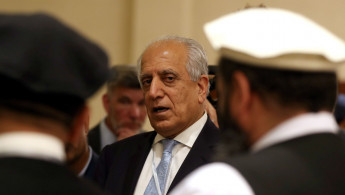Kabul, Taliban 'far apart' in peace talks: Khalilzad
The Afghan government and Taliban insurgents remain far from reaching a peace agreement, the US representative to the negotiations said on Tuesday as Washington upped pressure on Kabul to reach a deal.
As new explosions rocked the Afghan capital and fighting intensified over the control of three provincial capitals, Zalmay Khalilzad, the US Special Representative for Afghanistan Reconciliation, said the Taliban are demanding a new government with most power in their hands, while Kabul wants to bring them into the current government.
"They are far apart, and they are trying to affect each other's calculus, and the terms, by what they are doing in the battlefield," Khalilzad told the Aspen Security Forum.
With the deadline for the US troop withdrawal just 28 days away, in a phone call on Tuesday US Secretary of State Antony Blinken and Afghan President Ashraf Ghani called for a deal with the insurgents.
"The Secretary and President Ghani emphasized the need to accelerate peace negotiations and achieve a political settlement that is inclusive," the State Department said in a readout of their call.
Blinken meanwhile reiterated "the strong and enduring US commitment to Afghanistan" and the two condemned recent Taliban attacks as showing "little regard for human life and human rights," it said.
Khalilzad said the Afghan government and its international supporters do have leverage against the hard-line Islamists, saying they want any future Taliban-led government to receive international recognition, which they largely lacked when they held power in the 1990s.
"The Taliban say they do not want to be a pariah state," he said.
"They said they didn't know what recognition was when they came to power in the nineties," he said.
"But now they do. They want to receive assistance. They say they want to be get off to various lists that put restrictions on travel for them," he said.
"They recognise that if they don't have normal relations with others, others could support their opponents in Afghanistan."
Khalilzad said that some of what is holding up an agreement are "the personal interests" of leaders.
He said the Kabul government "has to be realistic in terms of what kind of a political settlement" can be achieved.
"The government needs to need to understand that there is no military solution to the conflict in Afghanistan," he said.





 Follow the Middle East's top stories in English at The New Arab on Google News
Follow the Middle East's top stories in English at The New Arab on Google News
![The UAE is widely suspected of arming the RSF militia [Getty]](/sites/default/files/styles/image_330x185/public/2024-11/GettyImages-472529908.jpg?h=69f2b9d0&itok=Yauw3YTG)
![Netanyahu furiously denounced the ICC [Getty]](/sites/default/files/styles/image_330x185/public/2024-11/GettyImages-2169352575.jpg?h=199d8c1f&itok=-vRiruf5)
![Both Hamas and the Palestinian Authority welcomed the ICC arrest warrants [Getty]](/sites/default/files/styles/image_330x185/public/2024-11/GettyImages-2178351173.jpg?h=199d8c1f&itok=TV858iVg)